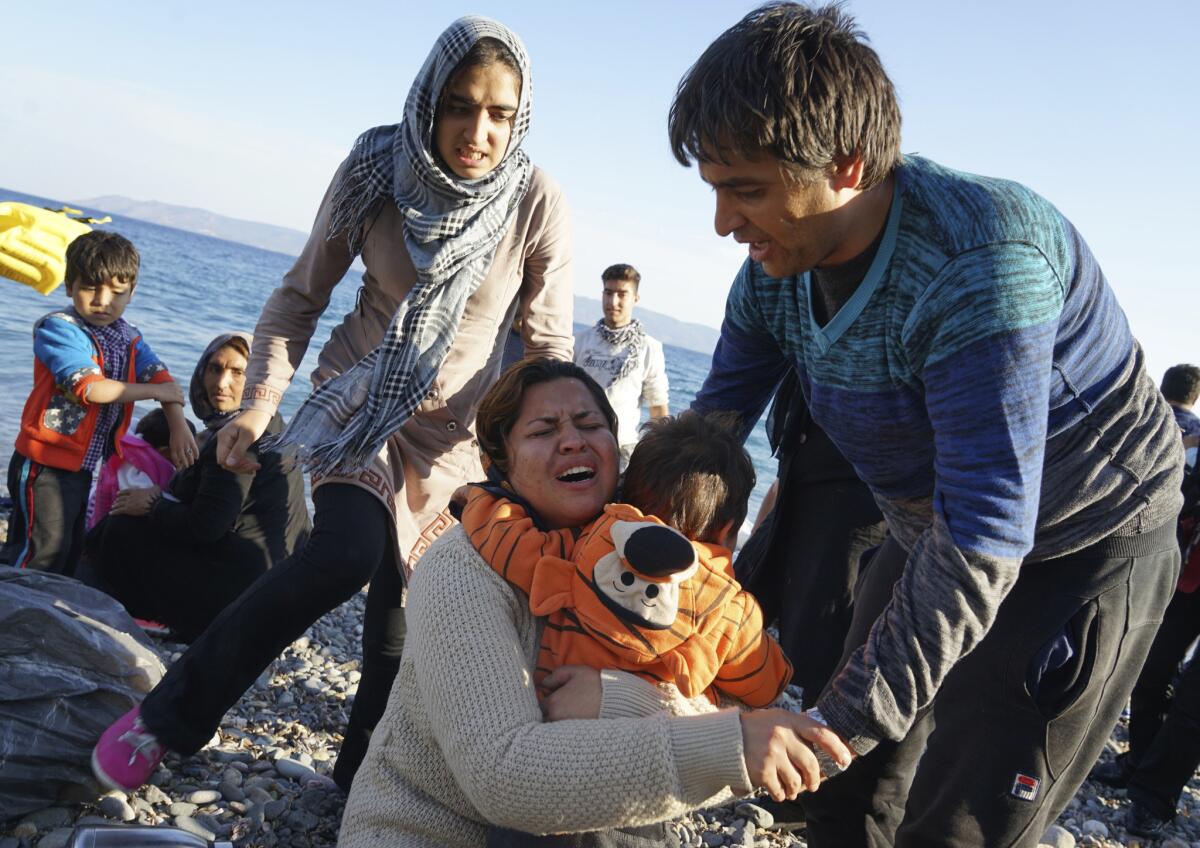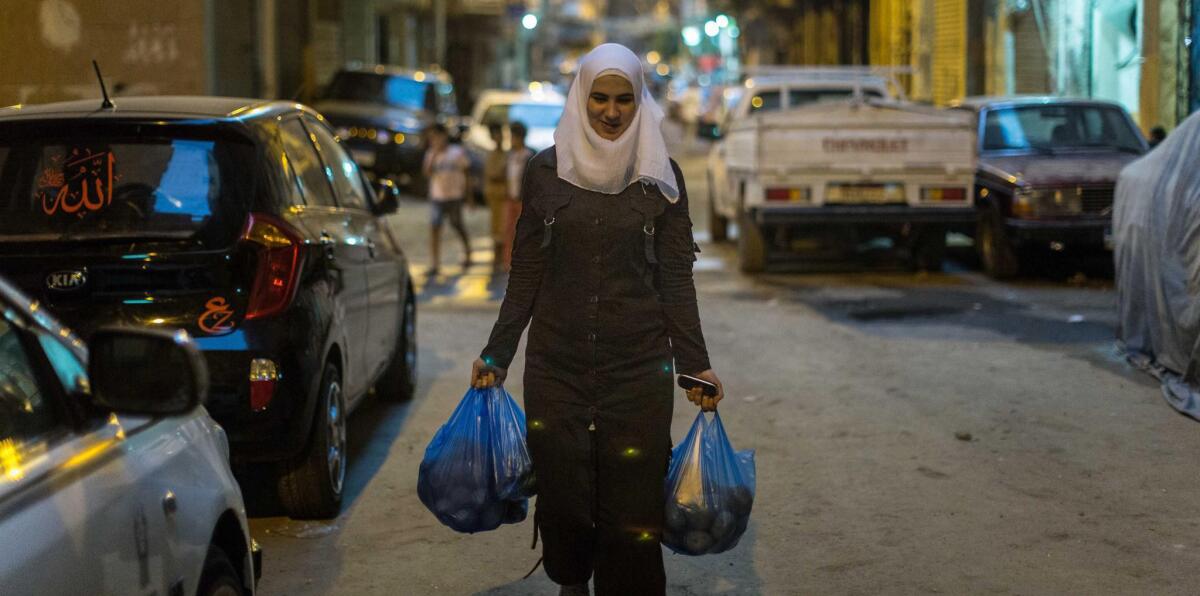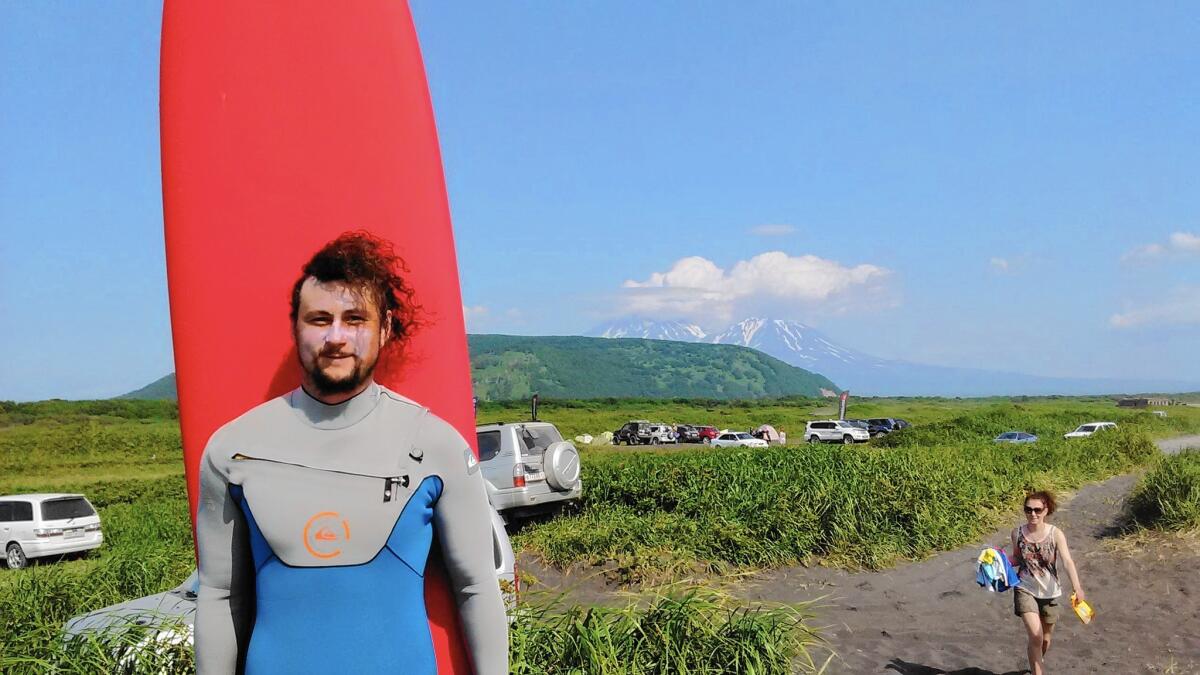Great Reads: Stories of sacrifice, and a stack of used books
- Share via
Hey there. I'm Kari Howard, and I edit the Great Reads (a.k.a. Column Ones) for the Los Angeles Times.
Two of my biggest loves are narrative journalism and music, and I'm lucky that my days are filled with both: When reading the stories, I get inspired by songs I think fit the article's theme -- a soundtrack.
I've just come back from three weeks of vacation, so I'm catching up with a few of the Great Reads (and lowercase great reads) that ran while I was away, plus their soundtracks.
"I'm doing this to save you, our child, and everyone on board"
The beginning of this story by Patrick McDonnell took my breath away: The gray rubber dinghy that carries Huda Malak, pregnant with her first child, sags to sea level as it approaches Lesbos. The overloaded raft has been taking on water since it launched from a crag off the Turkish shore, about six miles away. The 18 Syrians on board desperately try to bail water from the sinking craft. Weight, they need to shed weight. They start jettisoning backpacks that hold most everything they still own. A trip that should have taken 45 minutes has lasted double that, and they are still a mile from the Greek island. Suddenly, Malak’s husband, Tarek Sheikh, stands up. “I’m doing this to save you, our child, and everyone on board,” Sheikh tells her. Then he jumps overboard. His weight makes the difference, and the raft chugs toward land as Malak looks back to where her husband disappeared into the Aegean. Patrick follows the Syrian migrants as they make their way across the island, by foot, and then on to the new promised land: Western Europe. A tour de force of reporting.

Family members embrace in relief after reaching Lesbos.
Family members embrace in relief after reaching Lesbos. (Liliana Nieto del Rio / For The Times)
The soundtrack: "The Salt," by Small Sur. When I read this story and another in the "Fleeing Syria" series (see below), I found myself listening to the Small Sur album "Labor" nonstop. Something about the meditative mood, with a touch of melancholy, seemed to work with the stories.
A sisterhood of secret sorrows in a home not their own
If Patrick McDonnell's installment of the "Fleeing Syria" series grabbed you by the throat, the one by Laura King drew you in more gently: The lemons here are not as large and sweet, the olive oil not as fragrant, the parsley not as fresh as that plucked from herb gardens at home in Syria. But they will do what they can with it, they concede at last. Another day of cooking together unfurls like a sail before them, and from this moment, the hands of these six women are never at rest. The sharp perfume of diced mint fills the air. There is comfort in the familiar rituals -- chopping tomatoes, mincing garlic, pinching pastry. But the sense of loss rises to the surface like bubbles in the vat of aromatic stew that is soon set to simmering on the stove. Ghazwa and Zoukaa, Ihklass and Mona, Kamar and Fatih: Their culinary sisterhood came together in this ancient city on the shores of the Mediterranean, a gathering after a scattering from a war seemingly without end. This is a story of the little moments, of quiet observation that draws out the heartbreak of their exile.

Yasmine, Kamar’s 16-year-old daughter, brings vegetables to the catering business.
Yasmine, Kamar's 16-year-old daughter, brings vegetables to the catering business. (Liliana Nieto del Rio / For The Times)
The soundtrack: "Sometimes," by Small Sur. "Sometimes she cries without warning/And other times I expect the tears to come/Holding her breath deep and long till brackish waters fill up her lungs." I listen to this and see the women of this story cutting their vegetables, rolling their pastry, sharing their secret sorrows.
I loved the headline for this story: A shot at rodeo redemption
I have a horse, so this story by Nigel Duara about the bond between a "failed" bronc and the rider who believed in him had me at hello. More than most sports, horse riding involves a partnership, a trust in each other. He writes: Who can say why a team works? It's not simply a measure of paying for the most talent. Good teammates share some indefinable connection, when magic occurs and the partnership is greater than the sum of its parts. On this June evening in Prescott, Runyan and Bruce would begin to find out if they had it. The ending to the story seemed to be about much more than just a horse and rider, and could easily be about love, and life: People (and horses) aren't failures -- they just need to find the right partner.

Bryce Runyan acquired Bruce, whose owners were not ready to sell the sweet horse, in a kind of lifetime lease: A $1,000 down payment and training. (Nigel Duara / Los Angeles Times)
The soundtrack: "Who's Gonna Ride Your Wild Horses," by U2. I don't care what people say -- I'll always like the "Achtung Baby" album. (Oh, and I love it when reporters tell me their soundtracks for stories, what they listen to as they write. Nigel says he started with DeVotchKa (whose melodrama I go for in a big way when the mood hits) and then settled on "For Reverend Green," by Animal Collective.)
Surfing at the end of the world — catching a (really cold) wave
The Kamchatka Peninsula seems like one of the least accessible and hospitable places on Earth. It's nine time zones and 4,000 miles from Moscow. No roads link the region to the Russian mainland. Active volcanoes loom over the land. The waters off the coast don't hit 50 degrees, even in summer. But down on the beach, overlooking the windy North Pacific, Anton's surf hut is a happening spot. In this story made for California readers, John Hannon takes us to what may be surfing loneliest outpost: "There are three stereotypes that I fight against," he explains before the competition, his soft voice masking his determination to popularize surfing here. "People think there are no good waves in Russia, that the water is too cold, and that you can't get a wetsuit or board here." Morozov, whose last name means "frost," did acknowledge that it gets chilly in winter, when the water temperature drops to 28 — 4 degrees below freezing. "So far," he says, "not many people are willing to go out with me."

Surf hut owner Anton Morozov is determined to popularize surfing in Kamchatka, Russia, especially among younger people.
Surf hut owner Anton Morozov is determined to popularize surfing in Kamchatka, Russia, especially among younger people. (John Hannon)
The soundtrack: "Let's Go Surfing," by the Drums. Just saw them play this at FYFest, and it was a blast. Look up "catchy" in the dictionary, and this song will be there.
What I'm reading online
I tried to unplug during my vacation, so all of my reading recommendations this week are of the ink and paper variety -- see below.
What's on my bedside table
I went to Nova Scotia on this vacation, so I decided to read the short stories of the Cape Breton writer Alistair MacLeod. (I'd already his wonderfully titled novel "No Great Mischief.") I don't know when I've been more in love with the rhythm of a writer's language than I am with "Island." I read several passages aloud, because the poetry in them demanded to be heard, not just silently read. Here are a few: "But yet it seems that all storms subside first into gusts and then into calm and perhaps without storms and gusts we might never have any calm, or perhaps having it we would not recognize it for what it is." "Then she alone bore the burden of the watching and the waiting and it was much easier then, for unlike her husband she bore her burdens silently and you did not realize that she worried at all unless you happened to catch her in an unguarded moment."
At my favorite used bookstore in Maine, I picked up a dozen books for $20. I've started a few of them, including "More Than You Know," by Beth Gutcheon. (I really admired her "Still Missing," a haunting story about a child who disappears. Am a little more neutral on this one.) And "The Provincial Lady in London," by E.M. Delafield, a continuation of the absolutely wonderful "The Diary of a Provincial Lady." If you want to read the book that surely helped inspire "Bridget Jones's Diary," track this novel down. So funny. Among those still unread: "The Points of My Compass," by E.B. White (who spent a large part of his life in Maine); "Tender is the Night," by F. Scott Fitzgerald (Confession: I've never read it); and "Down East Detective," a collection of stories inspired by old Maine state trooper reports.
What's on my turntable
Although I spend most of my time listening with headphones to Spotify, sometimes I want to hear the needle touching down on vinyl. That's why I have a turntable in my office -- and two at home (one inside, and a battery-powered one outside when the weather's fine -- which it usually is in Southern California). This week's vinyl: "Full Moon" by Kris Kristofferson and Rita Coolidge. I found a treasure trove of vintage vinyl in Maine, including one place where they were selling albums for a quarter! I realize now I should have broken the bank and gotten 40 of them there alone -- for $10. This 1973 album cost $3, I think, but it's worth it. Kris and Rita released it right after they were married, and you can tell how smitten he is with her. He was the bigger star, but he gave her all the best parts and let her shine. Sigh.
Want to chat? Have a great idea for a Great Read? I'm @karihow on Twitter and kari.howard@latimes.com on email.
Sign up for our Book Club newsletter
Get the latest news, events and more from the Los Angeles Times Book Club, and help us get L.A. reading and talking.
You may occasionally receive promotional content from the Los Angeles Times.







